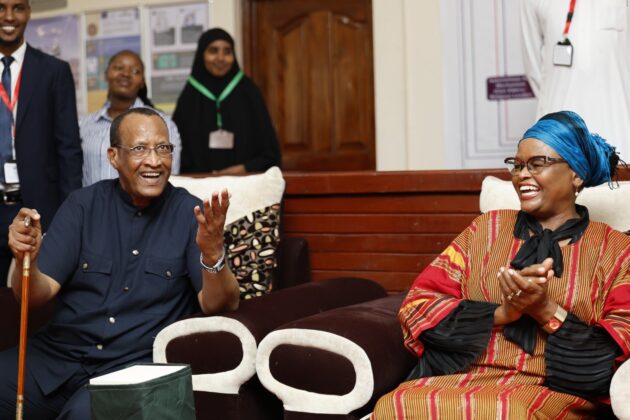
CJ Koome Launches Al-Islaah Alternative Justice Centre in Garissa » Capital News
NAIROBI, Kenya, Sep 2 – Chief Justice Martha Koome has officially launched the Garissa County Alternative Justice Systems (AJS) County Action Plan, the Garissa AJS Model, and the Al-Islaah Justice Centre, marking a significant milestone in the Judiciary’s efforts to promote community-based dispute resolution.
Speaking during the event, CJ Koome highlighted that the Al-Islaah Justice Centre will serve not only as a hub for resolving disputes but also as a powerful cultural symbol of peace, dialogue, and unity.
“The term Al-Islaah, meaning ‘reconciliation’ in Arabic, captures the spirit of this centre. It will be a place where the wisdom of elders, the moral authority of religious leaders, and the knowledge of trained mediators converge to offer citizens solutions that heal relationships rather than deepen divisions,” said CJ Koome.
She emphasized that justice is not solely about punishment, but about restoration—mending broken bonds and fostering lasting peace within society.
The Chief Justice noted the significance of the launch, stating that the Judiciary was recognizing and elevating the Maslaha system and other indigenous mechanisms that have served as the backbone of dispute resolution in Garissa for generations.
“Garissa, with its rich Somali traditions, strong religious heritage, and unique cross-border realities, has always known that justice cannot be confined to the four walls of a courtroom. Justice must live in the community, in the baraza, in the mosque, and in the council of elders,” she said.
By unveiling the Garissa AJS County Action Plan, the Judiciary is reaffirming the constitutional mandate under Article 159(2)(c), which obligates the promotion of alternative dispute resolution methods, including traditional systems.
The Garissa AJS Model is designed as a hybrid system, drawing from three interconnected streams: the autonomous mechanisms such as elders and religious leaders, the court-annexed panels embedded in the Garissa Law Courts, and state-based institutions such as the National Government Administration Officers like the Chiefs and Assistant Chiefs.
“Together, these streams form a multi-door approach to justice—an approach that allows citizens to choose from multiple avenues of redress depending on their needs, while ensuring that human rights, dignity, and constitutional values are upheld,” CJ Koome explained.
She acknowledged that formal courts alone cannot handle the full burden of disputes—particularly in counties where vast distances, illiteracy, and poverty limit access to the justice system. Strengthening AJS, she said, brings justice closer to the people—delivered in their own language, within familiar cultural frameworks, and at minimal cost.
CJ Koome emphasized the critical role AJS plays in peacebuilding and conflict transformation, especially in counties like Garissa, where land disputes, resource-based conflicts, and cross-border tensions—including with neighbouring Somalia—are common.
“By empowering elders, religious leaders, and community actors to resolve disputes early and fairly, we reduce the risk of violence, strengthen social cohesion, and give our young people a future free from cycles of revenge and retaliation,” she stated.
She also stressed the importance of inclusivity in the AJS framework. The Garissa AJS County Action Plan commits to rights-based justice that ensures women, youth, minorities, and persons with disabilities are not merely beneficiaries, but active participants in shaping outcomes.
“To our AJS practitioners—including elders, religious leaders, and NGAOs—let us ensure that justice under AJS respects constitutional values and protects the vulnerable, particularly women and children,” CJ Koome urged.
Speaking during the launch, Garissa Governor Nathif Jama committed to devolving the AJS Suites Sub-County level saying that the AJS model will promote reconciliation, enhance community cohesion, and restore trust in justice systems by embedding traditional conflict resolution within the formal judicial framework—ensuring that justice is not only done but also seen to be fair and culturally relevant.
“Today we are honored to host the Chief Justice in Garissa. Our partnership in championing the AJS model demonstrates our shared vision of making justice simple, affordable, and closer to the people. This initiative will strengthen peace, cohesion, and accountability in our communities,” Governor Jama noted.
Chief Registrar of the Judiciary Winfridah Mokaya on her part observed that the launch in Garissa was significant because the County is uniquely placed to demonstrate the power of AJS. Garissa has a proud heritage of elders’ councils, strong Islamic traditions of justice, and vibrant community structures where dialogue, reconciliation, and consensus remain central to resolving disputes.
“The launch of the AJS Suite here is therefore not just a programme milestone, but also a recognition of this region’s strong culture of community-driven justice,” said CRJ Mokaya
The CRJ emphasized the need to fund justice in its fullness as we look into the future — both formal and informal noting that building modern courts, supporting mobile courts, and strengthening AJS mechanisms are not separate agendas; they are complementary pathways that expand the doorways of justice.
“Together, they ensure that whether a Kenyan seeks resolution before a Judge in a High Court, a Kadhi in a family matter, or elders through AJS, justice is accessible, trusted, and within reach,” said CRJ Mokaya.
With the launch of the 12th AJS County Action Plan, Garissa now joins eleven other counties that have implemented similar frameworks, advancing the Judiciary’s mission of delivering accessible, people-centered justice across Kenya.